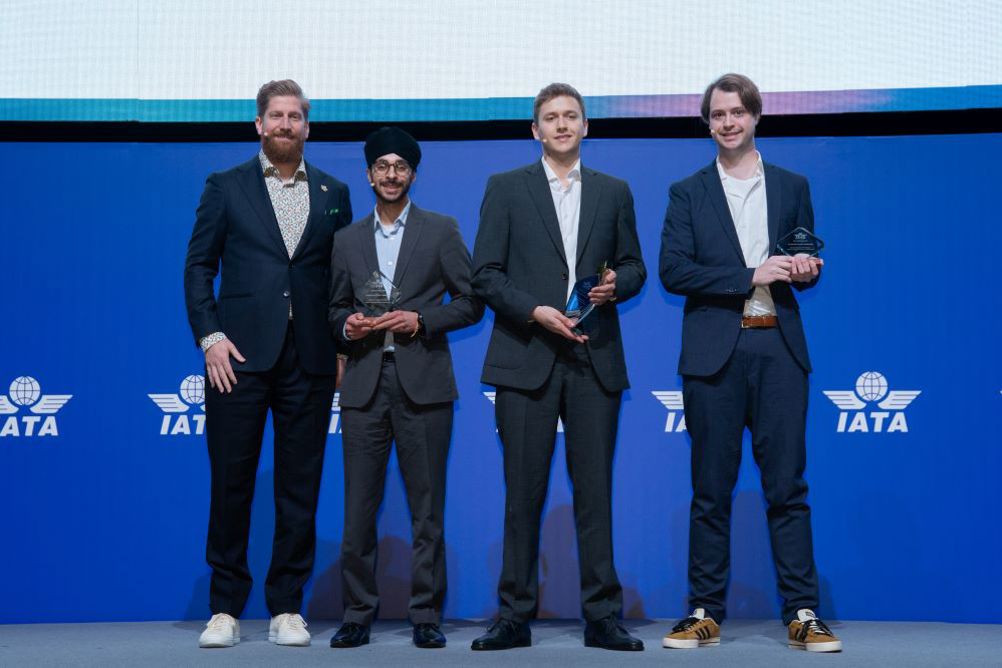
FACE UP! has been held for a number of years, giving recent graduates the chance to present their thesis in front of experts at the World Cargo Symposium.
Three finalists are selected by an independent panel of jurors, then the three give presentations in front of the audience who voted for a winner.
This year the finalists were Erik Goldenstein from Fraunhofer IML who presented NE:ONE Play, Arjan Singh Bhogal from Buckinghamshire New University with his presentation, Reducing the air cargo industry’s single-use plastic problem, and Niclas Scheiber from the Frankfurt University of Applied Sciences with his presentation Unleashing the semantic potential of ONE Record.
Goldenstein was voted the winner by the audience.
Goldenstein, a researcher at Fraunhofer IML Department of Aviation Logistics was the first on stage with his presentation, Getting started with ONE Record using NE:ONE Play.
He explained that ONE Record is the new data standard for air cargo and the NE:ONE Server is the first production grade implementation.
ONE Record contents the data model, which is used to store and capture data.
The data models are objects consisting of code, which has to be visualised to make it intelligible. This is what inspired him to create NE:ONE Play, which takes the raw data and creates user-friendly cards out of the data without lines of code.
Shipment data is stored on the airline’s server and piece data is on the shipper’s server with a link between the servers.
Data can be viewed with its connections with other parts of the data set.
It can be viewed in large graphs with everything on one canvas, which shows you when it was created, revisions, linked objects and an edit tool that so changes can be made when data is wrong and all collaborators are informed of the change.
Ending his presentation, Goldenstein said, “NE:ONE Play is the first and only tool that is perfect for teaching, development and compliance checking in the ONE Record ecosystem.”
Bhogal was second on stage, explaining there is a problem with single-use plastic that needs to be addressed.
The air cargo industry uses over 12,500 tons of plastic packaging per annum and blended biodegradable plastic wrap is the alternative to reduce virgin plastic consumption, Bhogal told the audience.
He praised Cathay Cargo’s work to use 50% recycled content, adding that more needs to be done to increase the figure further and to happen globally.
Countries have commitments to reduce plastic consumption and increase recycling, and there needs to be industry-wide collaboration to adopt a single-use plastic reduction goal, said Bhogal.
Short-term, Bhogal said sharing meteorological data is already helping flight plans and if the data was used in the cargo sector, cargo would not need to be covered in plastic sheets if there was little chance of rain.
A medium-term solution was to reduce palletisation and increase containerisation for general cargo.
In the longer term, Bhogal proposed replacing plastic wrap with sustainable hemp-based canvas tarpaulin lined with durable wax and using mushroom-based Mycelium foam instead of polystyrene packaging.
Explaining why the changes should be made, Bhogal said the weather data is available today and can be shared, containers allow for a better use of cargo space especially for e-commerce, and tarpaulins is already being used but those are made with fossil-based products.
The hemp is quick and easy to grow, and applying a wax will make it fire-retardant.
The Mycelium foam is already used in the logistics industry by companies like IKEA and Dell, who have seen greenhouse gas emissions falling by 90% compared to polystyrene.
“I call for the global industry to ensure that, especially in the top five airports including Hong Kong, we can trial these solutions because that will provide the maximum value,” said Bhogal to end his presentation.
Scheiber was the last to give his presentation, saying the ONE Record is linked data, which can be used in research where they have large databases for purposes such as digital twins.
He asked how this can be used with ONE Record.
One solution is to use ONE Record to recreate any document such as an AWB, NOTOC or any digital format that may be lost in a legacy API.
If legislators request data outside of ONE Record’s scope, ontology has that covered because raw data can be taken, put into a database and a virtual representation will be created that is accessible to legislators.
Using his solution, Scheiber was able to fill a simulation model of a cargo warehouse built in a Digital Testbed Air Cargo project to build a digital twin.
Data can be downloaded in real-time into the model and assess the upcoming flow of goods on piece level to determine if additional volumes can be handled, how staff absence will affect workflows and what happens if equipment breaks down, and other variables.
Scheiber had a message for the audience, “Keep in touch with academia, work with us. We are always interested in data and use cases. We will research on new concepts, go through papers, apply data theoretically and provide it to you to use practically. Air cargo is still under research and I wish that would change in the future.”
